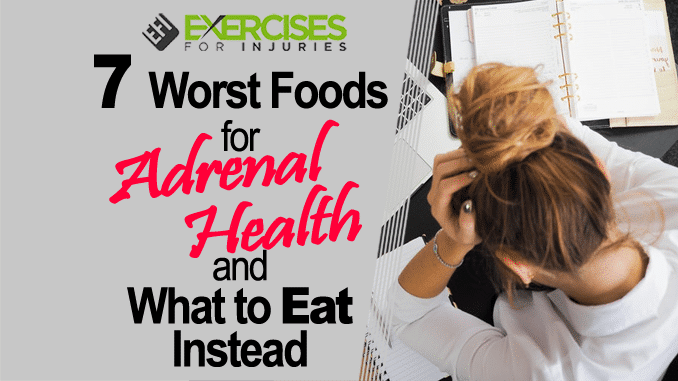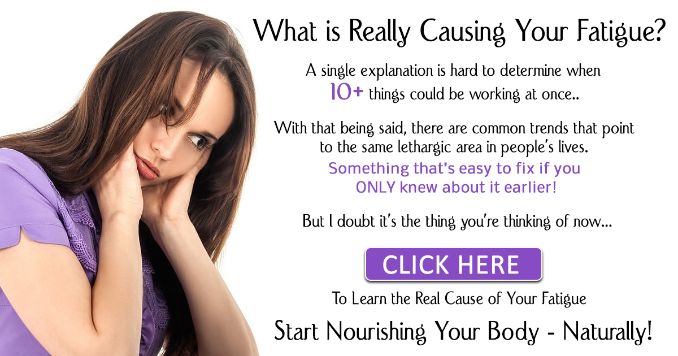
Everyone goes through stress now and then but, sometimes, that stress is excessive. Maybe you’ve experienced the death of a loved one, lost a job or suffered a serious illness. Perhaps you’ve just had too much on your plate for a while, and you’re starting to notice the effects more and more.
It’s time to ask yourself: Are you tired all the time, even after getting a good night’s sleep? Are you suffering mood swings, depression, insomnia, weight gain or brain fog? Do you feel like you have to have a cup of coffee even to get going in the morning?
If you answered “yes” to any of these symptoms, you might be the victim of adrenal fatigue. Although not an official medical condition, adrenal fatigue is thought to be real by many medical professionals. The good news is that if you are suffering from adrenal fatigue or something like it, a change in your diet and lifestyle habits may help you to feel much better.
What are the Adrenal Glands?
The adrenal glands are two small glands, one located atop each kidney. They produce a number of hormones, including the stress hormone “cortisol.” When you face a stressful situation, the adrenal glands release adrenaline to give you the energy and strength you need to “fight” or “flee,” then they release cortisol to help shut down some other systems that may interfere in the moment like the digestive system and immune system.
Once the stress has passed, hormone levels return to normal and cortisol can go about doing its other jobs, which include reducing inflammation, regulating blood pressure, controlling the sleep/wake cycle and managing metabolism.
If you’re under chronic stress, however, the adrenal glands have to keep working releasing hormones to deal with that stress. If you’re unable to release that stress — through exercise, expressing yourself or other methods — the cortisol stays in your bloodstream, where it may increase your risk of health problems like sleep problems, weight gain, headaches, digestive issues and even heart disease.
Moreover, if the stress continues for a long period, the adrenal system may become overtaxed and no longer function as it should.
What Is Adrenal Fatigue?
Dr. James L. Wilson first presented the idea that the adrenal glands could become fatigued in 1998. He was a naturopath and chiropractor and coined the term “adrenal fatigue” to describe a condition of suboptimal adrenal function caused by stress that was different from Addison’s disease.
Addison’s disease is a diagnosable medical disorder in which the body is unable to produce the hormones it needs because the adrenal glands are damaged somehow. Also called “adrenal insufficiency” or hypocortisolism, it creates symptoms like fatigue, weight loss, darkening of the skin, low blood pressure, cravings for salt, muscle and joint pain, irritability, hair loss and depression. Treatment includes taking synthetic hormones to make up for the ones that are missing.
Dr. Wilson was noticing that patients in his practice who were chronically stressed seemed to be having symptoms similar to those associated with Addison’s disease but at a milder level. He believed that the chronic stress overstimulated the adrenal glands, leading them to stop working as expected. Hormone levels, particularly cortisol, became unbalanced as a result, too much sometimes, too little at others. He wrote a book on the subject, “Adrenal Fatigue: The 21st Century Stress Hormone” and, since then, has taught other doctors about the condition.
Symptoms of adrenal fatigue include:
- Difficulty getting up in the morning, even after a good night’s sleep
- Chronic fatigue and tiredness
- Cravings for salty foods
- Dependence on stimulants like caffeine to function
- Spikes in energy at unusual times, such as late at night
- Insomnia
- Mild depression
- Nervousness and anxiety
- Digestive problems
- Body aches
- Low blood pressure
- Weight gain
Is Adrenal Fatigue Real?
Because the symptoms associated with adrenal fatigue can be caused by a number of other disorders and, because studies have yet to conclude that adrenal fatigue is a real medical disorder, it hasn’t yet been accepted as one in the medical community.
In a 2016 study entitled, “Adrenal fatigue does not exist: a systematic review,” researchers reviewed 58 studies on cortisol and found conflicting results, often because of poor study design. They concluded that “there is no substantiation that ‘adrenal fatigue’ is an actual medical condition. Therefore, adrenal fatigue is still a myth.”
Todd B. Nippoldt, M.D., writing for the Mayo Clinic, also noted that the theory behind adrenal fatigue — that the adrenal glands can’t keep up with the demands of chronic stress and thus fail to produce the hormones you need — remains “unproven,” and cautions patients that accepting a diagnosis of adrenal fatigue could cause them to overlook another potential medical problem.
Still, many patients have found relief in the treatment for adrenal fatigue, which includes three main steps:
- Reduce stress
- Consider helpful supplements
- Follow a specific diet
The good news is that the diet suggested for adrenal fatigue is a healthy diet that is good for anyone, so there’s no downside to giving it a try. To help you get started, we’ve got the seven foods you should avoid if you think you may be suffering from adrenal fatigue, along with the seven foods you should add more often to your daily diet.
7 Foods to Avoid If You Suspect Adrenal Fatigue
-
Foods for Adrenal HealthWhite sugar: Food for Adrenal Health: When you consume sugary foods, your body responds by releasing insulin to process it. That causes a spike in insulin, then a corresponding drop. When blood sugar drops, energy drops too, and it’s believed the body responds by stimulating the adrenal glands to release more cortisol to get your energy going again. In fact, the adrenal glands are known to play a role in blood sugar regulation. Sugar spikes, therefore, may be taxing to the adrenal system, so it’s best to limit intake of added sugars.
-
Caffeine: Caffeine acts on the adrenal system to jolt you awake, essentially putting you into fight or flight mode. It stimulates the stress response, requiring your adrenals to work harder every time you consume it.
-
Diet soda (artificial sweeteners): Food for Adrenal Health: Research has shown that artificial sweeteners can be harmful to health. They have been linked to weight gain (instead of weight loss) and to reducing the good bacteria in the gut microbiome. Like sugar, they can also cause blood sugar spikes and insulin surges, which can overtax the adrenal system.
-
Alcohol: You may feel that alcohol relaxes you, but it disrupts deep REM sleep, causing you to wake up in the middle of the night or at least enjoy a less restful sleep. Alcohol can also depress the function of the adrenal glands, lowering production of cortisol. Regular alcohol consumption also causes blood sugar levels to rise.
- Fast food: If you’re craving junk food or fast food, it could be a sign that you’re suffering from adrenal fatigue. Fast food has been linked to inflammation and blood sugar spikes.
-
Processed food: Food for Adrenal Health: These packaged foods often contain a number of chemicals and preservatives that may interfere with digestion, and they are also typically high in sugar and or refined carbohydrates that can spike blood sugar levels.
-
Deep-fried food: These food for adrenal health typically contain unhealthy trans fats that have been linked to inflammation and increased risk for heart disease.
Also, make sure to avoid anything you’re sensitive to like gluten or dairy.
7 Foods to Eat More Often If You Suspect Adrenal Fatigue
-
Bone broth: This is a very nutritious food that helps boost the immune system and ease digestive ailments. It’s also an excellent source of essential amino acids that help support sleep, joint health and metabolism. Because it’s a good source of animal protein, it can help repair the damage done by excess cortisol while improving amino acid balance.
-
Nuts: Nuts are full of healthy omega-3 fatty acids and are a terrific source of protein. If you start replacing sugary, salty snacks with natural nuts, you’ll give yourself more long-lasting energy and reduce blood sugar spikes, which can keep you full longer and help ease the demands on the adrenal system.
-
Avocados: Food for Adrenal Health: These are also full of healthy fats that help lower blood pressure and tame inflammation. Inflammation taxes your adrenal glands, as it causes them to produce cortisol, which is an anti-inflammatory hormone. Taming inflammation however you can is a good step toward recovery.
-
Seeds (like pumpkin, chia and flax): These are quality sources of protein, which can help keep you feeling satisfied, and they also contain healthy fatty acids that are known to help tame inflammation. They’re rich in vitamins B, which help you deal with stress as well as good sources of magnesium, which are essential for muscle relaxation.
-
Yogurt (like kefir and kombucha): These foods for adrenal health are good sources of probiotics, which help restore good bacteria to the gut microbiome. Studies have linked probiotics with helping to ease symptoms of irritable bowel syndrome (IBS), which can sometimes accompany adrenal fatigue. Studies have also found that probiotics can help reduce stress. In 2011, for example, researchers found that daily supplementation with probiotics helped alleviate stress and anxiety in volunteers.
-
Leafy greens: Food for Adrenal Health: These vegetables are high in magnesium, which studies have found helps reduce inflammation and helps you cope with stress. In a 2017 review of 18 studies, researchers found some evidence that magnesium could reduce anxiety. A 2012 study also reported that a magnesium deficiency enhanced anxiety.
-
Cruciferous vegetables: Here, we’re talking about foods like cauliflower, cabbage, kale, radishes, broccoli and Brussels sprouts. They are all very good at reducing oxidative stress in the body, which is a natural consequence of chronic stress. They’ve also been linked with helping to reduce depression. They contain a compound called “sulforaphane” that researchers have found have antidepressant and anxiety-reducing capabilities. Finally, they all help tame inflammation.
For recipes to help reduce adrenal fatigue, check out Cooking for Adrenal Health, here!






